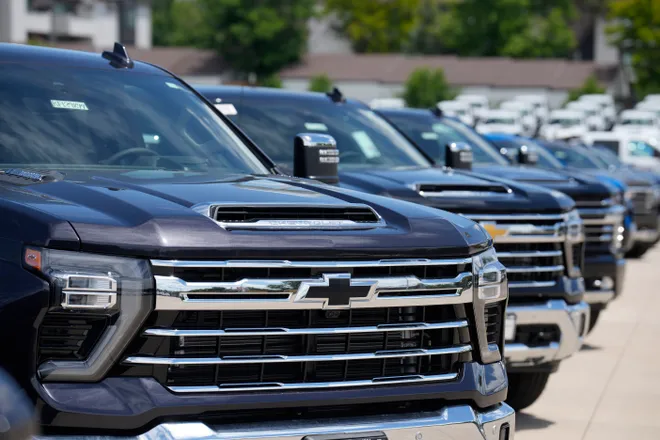Auto shoppers may be getting some relief as 2023 finally sees drop in new car prices
Car buyers are getting a respite in terms of rising prices on new vehicles.
On Wednesday, Kelley Blue Book released July pricing data that showed the smallest year-over-year price increase in the last decade, prompting Research Manager Rebecca Rydzewski to write, “New-vehicle price inflation has all but disappeared in 2023.”
According to Kelley Blue book data, the average price Americans paid for a new car was 0.4% higher than one year ago. The average transaction price of a new vehicle in July was $48,334, about $199 higher than it was in the year-ago period.

Reasons to head to a showroom
In more good news, data showed that compared with the start of the year, average transaction prices are down 2.7%, or $1,335, the largest January to July drop in the past decade, Kelley Blue Book data showed.
“New-vehicle prices, primarily driven by cuts in luxury and electric vehicles, are decreasing as inventory is steadily improving," Rydzewski said. "With higher inventories and higher incentives helping to keep downward pressure on prices, there certainly are good reasons for shoppers to be heading back into the market.”
In July, most carmakers increased the amount of incentives offered on new cars for the 10th consecutive month to the highest level since October 2021, averaging $2,148, or 4.4% of the average transaction price. One year ago, average incentive spending was 2.4% of the average transaction price, Kelley Blue Book data showed.
GM to keep its discounts low
But don't count on General Motors offering big discounts anytime soon, said CFO Paul Jacobson on Wednesday. He spoke at the J.P. Morgan 2023 Auto Conference, which was web streamed to the media.
"We’ve spoken pretty consistently over the last several months about potentially incentives normalizing, but it’s a new normal compared to before," said Jacobson, who's known to make public investments in GM to signal confidence in its profits to Wall Street.

GM is tweaking its distribution model so that it has more inventory than in recent years, but it is not returning to the past levels of flooding dealerships and then having to offer big discounts to move new cars.
“We’re tweaking our distribution models to make sure we get vehicles to market when it matters so that it’s there for consumers to streamline that process,” Jacobson said. “What you’ve seen year-to-date, and this continued in July, was the pace of GM incentive increases is significantly lower than what we see across the industry.”
He did not provide any figures, but he said GM will continue to match supply to demand to maintain its profit margins.
What is the average price of a car in the US?
In July, the average price paid for a new non-luxury vehicle was $44,700, a half-percentage point increase compared with the year-ago period and down by $471 compared with June.
But unlike five years ago, only the Mitsubishi Mirage subcompact car had an average transaction price below $20,000 at $19,205. In July 2018, there were a dozen vehicles below $20,000, Kelley Blue Book data showed. Many small vehicles including the Hyundai Venue, Kia Rio, Nissan Versa and Toyota Corolla are all transacting well over $20,000, it showed.
By contrast, there were 32 vehicles in the Kelley Blue Book database selling for an average price above $100,000 in July, and that excludes the uber luxury cars such as Ferrari, Lamborghini and Rolls-Royce. In July 2018, there were only 12 vehicles in the over $100,000 category.
But the average price paid for a luxury vehicle in July was down almost 3% year over year at $63,552.
Discontinued car models:What cars are being discontinued? List of models that won't make it to 2024
In the EV segment, increased inventory and price cuts by market leader Tesla have brought average transaction prices down there too.
In July, the average EV transaction price was $53,469, down from $53,682 in June and down 19% from the recent peak of $66,000 in June 2022. The average incentive on EVs was $3,755.
“Tesla prices are down nearly 20% versus a year ago, and other EV models, such as the Ford F-150 Lightning, have been following Tesla’s lead," Rydzewski said. "While automakers report losing money on electric vehicles, they continue to aggressively pursue EV growth strategies.”
Contact Jamie L. LaReau: jlareau@freepress.com. Follow her on Twitter @jlareauan. Read more on General Motors and sign up for our autos newsletter. Become a subscriber.
Disclaimer: The copyright of this article belongs to the original author. Reposting this article is solely for the purpose of information dissemination and does not constitute any investment advice. If there is any infringement, please contact us immediately. We will make corrections or deletions as necessary. Thank you.







